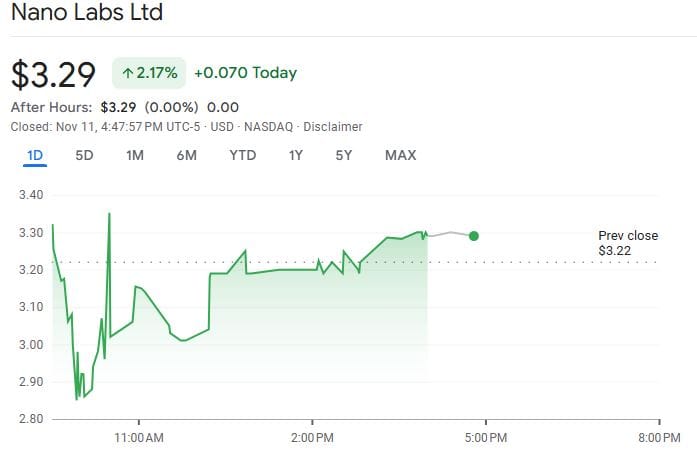Shares of China-based crypto mining chip designer Nano Labs saw a modest uptick after the company announced it would now accept Bitcoin as payment for its products and services through a Coinbase business account. In a statement on Nov. 11, the Nasdaq-listed company based in Hangzhou said this shift aligns with its commitment to “embrace the latest financial technology” as demand grows for digital currency transactions in the tech industry.
Nano Labs announced it’s taking a forward-thinking step to the digital economy, noting that cryptocurrency use is rising, especially among businesses looking for secure and efficient ways to handle cross-border payments. The company said adopting Bitcoin would give them “more payment flexibility,” though they didn’t specify if they plan to hold onto the cryptocurrency as part of their financial assets.
After the announcement, shares of the Nasdaq-listed company went up by 2.81% to $3.29. However, this small boost hasn’t made up for the drop in share price over the past month, which has plunged over 60% from a recent high of $8.33. It’s still far from its peak of $96.20 back in July. 2022, shortly after the company went public on the Nasdaq.

Major companies accept Bitcoin for services
More companies are starting to accept crypto as payment for certain services. Microsoft, for instance, lets Xbox users pay with Bitcoin, and McDonald’s now accepts crypto in El Salvador and Lugano, Switzerland. The Dallas Mavericks NBA team now accepts Bitcoin for buying team merchandise and game tickets, using BitPay for transactions.
In May. 2021, Beijing intensified its crackdown on cryptocurrency, shutting several mining companies and suspending crypto trading. Recently, though, the strict stance seems to have softened somewhat, even after a push to restrict Tether in January.
In a speech on Sept. 28 at Beijing’s Tsinghua Wudaokou Chief Economists Forum, former Chinese finance minister Lou Jiwei encouraged China to examine developments in the crypto space more closely.
Related | FTX bankruptcy estate targets Binance in $1.8B lawsuit







